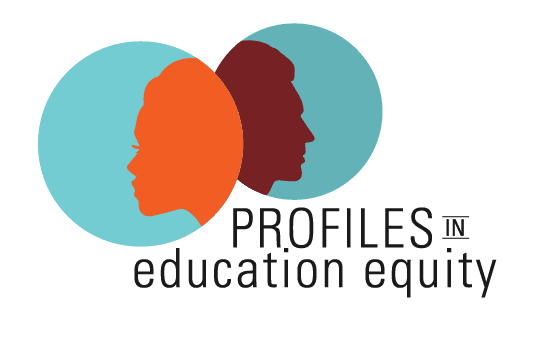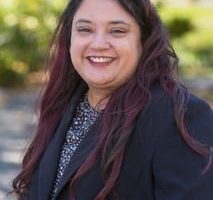Profiles in Education Equity: Geralde Gabeau, Immigrant Family Services Institute (IFSI-USA)
 Geralde Gabeau is the founder and executive director of Immigrant Family Services Institute (IFSI-USA), which provides targeted academic support and enrichment services, using a holistic approach that addresses the unique challenges of immigrant children. Originally from Haiti, Geralde helps bring people together to address the needs of children and families in local communities in Massachusetts.
Geralde Gabeau is the founder and executive director of Immigrant Family Services Institute (IFSI-USA), which provides targeted academic support and enrichment services, using a holistic approach that addresses the unique challenges of immigrant children. Originally from Haiti, Geralde helps bring people together to address the needs of children and families in local communities in Massachusetts.
What does education equity mean to you?
As an immigrant, it means everything. My parents always reminded my siblings and I growing up that they cannot leave wealth to us because they don’t have it; but, they can give us a great education so we can take care of ourselves and help others around us. Equity in education means opening our eyes to each child’s full potential and giving everything we have to ensure they thrive and become well-rounded citizens who positively contribute to the community. It means being intentional about investing in and preparing a solid and certain future for each child we have in our classroom. It means never making excuses for why a child cannot learn or access the resources needed to thrive. And it means that we, as leaders, do not rest until we know that each child has access to the highest quality level of education no matter where they live, where they came from, how they learn, or how wealthy or poor they are.
Define how you advance education equity in Massachusetts.
Advancing education equity is a day-by-day, week-by-week, and month-by-month endeavor. It requires time to meet with key leaders in the sector to identify barriers and opportunities. We remind administrators, teachers, and all stakeholders that our students matter and they deserve a high-quality education. We participate in the equity roundtable and the school reopening task force to make sure the voices of the students we serve (especially the immigrant families) are at the table.
As a member of the Massachusetts Education Equity Partnership, we work with Ed Trust and other leaders in the education field to make sure that equity remains at the forefront of everything we do.
We organize parents around various key policies. We meet with them regularly to educate them about what is going on in the schools, and to equip them to advocate for their children. We seize any opportunity to present at conferences and to keep the topic at the forefront of any conversations.
Share one big success from your work to date.
We are very proud of our virtual summer program, which not only builds students’ academic skills, avoiding the setbacks that so many working-class students experience over the summer, but also enriches their lives through exploration and art, and helps build community.
Typically, we enroll about 150 students in three “academies”: lower, for K-3; middle, for grades 4–7; and upper, for grades 8–12. This time, 295 kids signed up. By going virtual, we had actually removed a major barrier: transportation. Along with students from Boston, we got some from Brockton and Randolph, which have big Haitian communities, too.
For six weeks, we welcomed students for morning sessions in English, math and science, and then after a lunch break, two hours of enrichment activities: music, dance, martial arts, chess, coding. Every Friday we had fun, with competitions and virtual field trips: to the aquarium, to a space center, even to Mars (because online, you can go anywhere!).
We brought together team members with different types of expertise, along with parents, supporters, funders. We had to arrange for a parent, grandparent, or friend to help the smaller kids log on every day. We sent lots of packages home, too, with snacks, pens, crayons, and paper. We even worked with parents to make sure the students would take a real break over lunch – go outside, run around – but stay logged on, so they could come right back at 1pm. And we set up a system of prizes every Friday, $5 or $10 gift cards, books, and other small things to motivate the kids. Parents were enthusiastic, too; many joined us in the evenings for English, computer, and financial literacy classes.
Everyone keeps saying how hard this crisis has been. The way I see it, our world is changing. We will face difficult situations like this more and more. We need to be very proactive. Whenever something happens, students of color and immigrants are the first to fall through the cracks. They do not have access to resources, and it is often assumed that it is just too difficult to meet their needs under the circumstances. But there is always a way to do it. It takes a team effort. You cannot possibly succeed without engaging with families, understanding their situation, and tailoring your programs to meet their needs. But at IFSI-USA, we have proven that it can be done.
What do you think are the most pressing education equity issues right now? How can advocates address this challenge?
In general, I’m very concerned by the persistent inequities in our schools and the failure to shift gears so students of color are well served. Access to reliable internet and technology is now a top priority for our families. We need to do much more to empower parents, too, and ensure that their concerns are heard without having to fight and fight to get what their children need.
What’s next in regards to your work?
We are continuing our pioneering efforts to keep students learning and engaged through the pandemic. We also continue our advocacy with the Boston Public Schools, and we’re supporting families through the numerous challenges they face right now: from housing and food insecurity, to the fear of deportation. We are also launching the immigrant navigator model as a way to provide a “one-stop center” to our newly arrived families as a way to support their smooth transition to their new communities.
We continue to dream about this special era where children with disabilities, and/or who speak languages other than English, and those who are less fortunate to have educated parents at home to support them, will enter school as a village where everyone has one goal: ensuring the proper education of each child. We continue to dream about a time where access to quality education is no longer a luxury but a normal way of belonging to any community for a brighter future.

